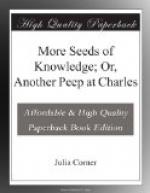Peter was not an English boy, he was a West-Indian: his father and mother lived in Jamaica, but they had sent him to England to be educated, so he lived with his uncle in Euston-square, and went every day to the London University school. Charles was very fond of talking to Peter, because Peter told about the slaves that worked on his father’s plantations, for his father was a sugar planter, and had a large estate in Jamaica, so he was obliged to keep a great many negro slaves, for all the plantations in the West-Indies, are cultivated by negroes.
“I wish I had a slave,” said Charles to his papa one evening, after he had been playing with Peter. “Do you know, papa, when Peter was at home in the West-Indies, he had a slave of his own, a black boy, to wait upon him, and do every thing he wanted; and Peter was his master, and he was not older, then, than I am. What a nice thing it must be to have a slave of one’s own; I should get him to carry my kite, and my hoop and stick, when I don’t want to bowl it, and mend my toys when I break them, and do a great many things for me. He could move my rocking horse, and that great wooden box where I keep my bats and balls, for it is too heavy for me to lift myself, and I often want it moved: really a slave would be very useful to me, papa.”
Mr. Barker could not help laughing at Charles’s idea of the usefulness of a slave, and asked him if he knew exactly what slaves were.
“Yes,” replied Charles; “they are black people.”
“A great many slaves are black, certainly,” said his papa, “but is not being black, that makes a man a slave, and there have been many unfortunate white people sold for slaves, as well as the poor blacks.”
“Sold!” said Charles, “what, do they sell people, I never heard of that before.”
“Then I will tell you now, my dear, and I think you will never again wish to have a slave. When America was first discovered, which is about three hundred and fifty years ago, there were many gold mines found in the West-Indies, all the mountains contained a vast quantity of gold, but it was very hard work to dig for it, and the natives of the country, who were savages, were not strong, and had never been used to work; so that the Spaniards who had discovered the country, could not get as much gold as they wished, although they were cruel enough to force the poor savages to work in the mines, and chained them together; that they might not run away; poor creatures! they were much to be pitied, and numbers of them died every day, for they had not strength to bear such hard labour. So when the Spaniards found that the Indians could not do as much work as they wanted done, they employed sailors to go to Africa and bring them a number of black men from that country; for they knew the Africans were strong, and that they could make them work as hard as they pleased.”
“But why did the Africans go, papa?” said Charles, whose eyes were full of tears at this sad tale. “Why did they not send the sailors away again, and say they would not go with them?”




